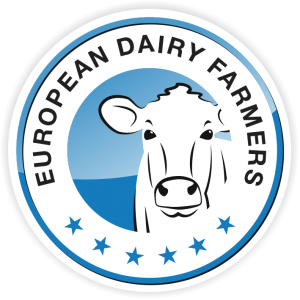 Between June 24th and June 26th, 2015 about 400 dairy farmers and professionals from 25 European and overseas countries got together in Rostock’s city hall for the congress of the European Dairy Farmers Association (EDF).
Between June 24th and June 26th, 2015 about 400 dairy farmers and professionals from 25 European and overseas countries got together in Rostock’s city hall for the congress of the European Dairy Farmers Association (EDF).
25 th Anniversary EDF
This year the European Dairy Farmers celebrated their 25th
anniversary under the motto “25 years entrepreneurship –
always looking into the future” and discussed business
concepts for dairy farms after the end of milk quota.
25 years after the German reunification modern dairy farms
have emerged in Mecklenburg-Western Pommerania, the
host province of the anniversary EDF congress. How did they
tackle the economic upheaval and how are they positioned
for the future?
Farm management
When visiting the German EDF farms in Mecklenburg-
Western Pommerania it became clear once more that the
farm size isn’t related to the level of animal welfare or the
general appearance of a dairy farm. Many of the congress
participants were impressed with the cleanliness and the
atmosphere on these farms, where up to 1800 dairy cows
were kept. Characterising for the success of the visited EDF
farms were a steady and deliberate growth, thoughtful
planning and foresight, the achievement of good technical
results and manageable risks and investments.
It is difficult to be efficient
A part of the European Dairy Farmers have a lot smaller
farms where it often is a lot more difficult to operate
efficiently. It was especially for farm managers of smaller
farms impressive and important to see how organized and
rationalised the farms in Mecklenburg-Western
Pommerania are. On small scale farms, you often discover
the heavy workload when too many things become an
immediate emergency.
“The world is hungry for dairy products”, stated Dr.
Jeremy Hill, IDF President, and it is not about which
production system is the best and which country performs
the best. We need it all! But getting there is going to be a
volatile process and it will be the same for each and every
country whether you are in Europe, in the United States or
in New Zealand. Every production system needs to be more
resilient and more efficient.
Global milk production
On the other hand “a trend is a trend is a trend that may
bend” in the long run”, stated Dr. Folkhard Isermeyer from
the Thünen Institute, Germany. Dr. Isermeyer is referring to
the current trend of an increase in global milk production by
having bigger herd sizes, increased milk yield per cow as
well as a decrease in total numbers of farms, concentration
of milk production in certain regions, and increased milk
prices. But what if this trend changes? Milk prices may
decrease, EU may become a net milk importer and a new
paradigm regarding social acceptance for animal husbandry
and intensive farming could change the outlook for dairy
farmers. Could this be a comeback for small scale family
farms? How will the long-term development for dairy
farming look like? And which opportunities will arise from
this?
Cost of production
Steffi Wille-Sonk, EDF scientist, confirmed a trend from
earlier years when milk prices went up, cost of production
increased in the same proportion. Is this because we invest
in future growth? Labour input still remains a crucial issue.
There are differences in the economic performance
amongst dairy farmers in Europe and realizing the potential
for improvement is crucial for every farmer. When will your
performance be profitable? asked Steffi Wille-Sonk this
year again the audience. Determining the risk a farmer is
willing to take is especially fundamental for young farmers
which plan to invest heavily. Do we set too much “hope” on
the accounting balance, and don’t focus enough on
entrepreneurial skills, asked a farmer. We’re market actors and global forces will change
trends and perspectives.
Out of the box
Marco Freiherr von Münchhausen, author and coach,
warned us about our “inner Schweinehund” – our inner
saboteur- who prevents us from finding interesting ideas
outside of traditional schemes. In general, farmers (as most
entrepreneurs) are looking for transparency, clear trends,
secure markets, stability and are trying to limit the risks.
We need to separate ourselves from this, have to realign
ourselves and give up old thinking patterns in order to find
solutions that are outside the box. Adjusting to a new way
of thinking in order to be able to adapt easier and to be
proactive instead of struggling against constraints, rules and
challenges. We have to think differently, think diverse but always look
into the future.
EDF and future
European Dairy Farmers in an association of future-oriented
dairy farmers from all over Europe. We meet up regularly to
share experiences and knowledge on all aspects of milk
production. There both, economic performance and future
assessments are compared. Katrine Lecornu, dairy farmer
from France, is the President of EDF.
European Dairy Farmers (EDF) e.V.
Judit Kühl (General Manager)
Grüner Kamp 19-21
24768 Rendsburg
GERMANY
Phone: +49 (0) 4331 4360190
Email: judit.kuehl@dairyfarmer.net
Web: www.dairyfarmer.net

